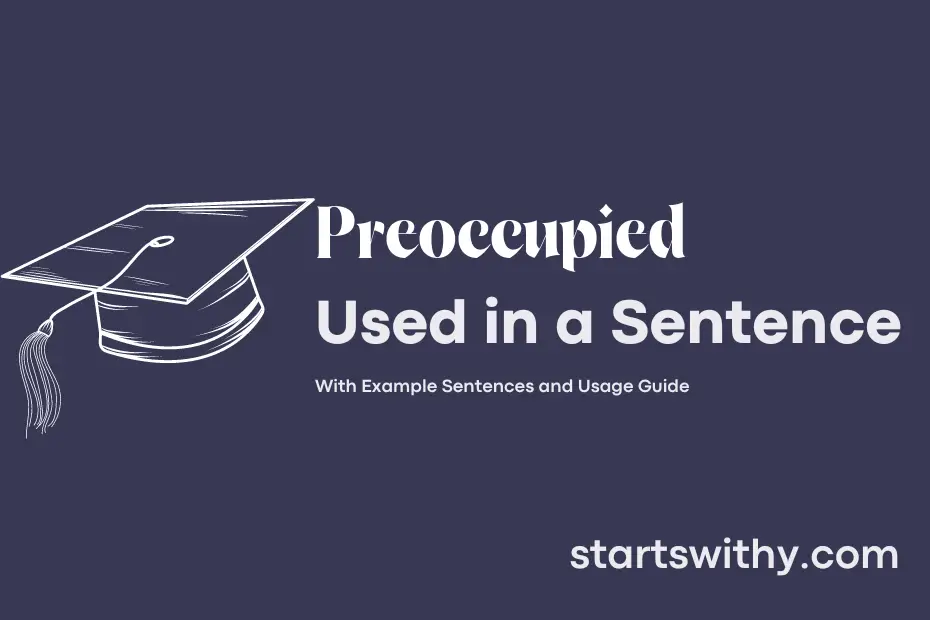Do you ever find yourself so engrossed in your thoughts that you can’t seem to focus on anything else? This state of being fully absorbed in one’s own mind is known as being preoccupied.
When someone is preoccupied, their mind is completely consumed by a particular thought, worry, or task, making it difficult for them to pay attention to what is happening around them. This mental state can cause individuals to appear distracted, forgetful, or distant as they grapple with the thoughts occupying their mind.
7 Examples Of Preoccupied Used In a Sentence For Kids
- I was preoccupied with playing games at recess.
- She was preoccupied with drawing colorful pictures.
- He was preoccupied with counting all the blocks.
- They were preoccupied with singing songs together.
- The teacher was preoccupied with reading us a story.
- I was preoccupied with arranging my toy cars.
- She was preoccupied with dancing to the music.
14 Sentences with Preoccupied Examples
- Preoccupied with preparing for upcoming exams.
- Feeling preoccupied with thoughts about future career prospects.
- Always preoccupied with checking social media notifications.
- Preoccupied with completing assignments before the deadline.
- Constantly preoccupied with finding affordable food options on a tight budget.
- Easily preoccupied with concerns about academic performance.
- Often preoccupied with planning group study sessions with classmates.
- Preoccupied with participating in extracurricular activities alongside academics.
- Frequently preoccupied with managing time between college and part-time job.
- Preoccupied with researching internship opportunities for gaining work experience.
- Always preoccupied with maintaining a balance between academics and social life.
- Easily preoccupied with comparing academic achievements with peers.
- Constantly preoccupied with finding reliable study resources.
- Preoccupied with attending career fairs and networking events to secure job opportunities.
How To Use Preoccupied in Sentences?
Preoccupied means to be engrossed in or consumed by thoughts or feelings. It can be used to describe someone who is so focused on a particular thing that they are not paying much attention to anything else.
Example sentence: She was so preoccupied with her upcoming presentation that she forgot to eat lunch.
Here are a few tips on how to use preoccupied in a sentence:
-
Identify a situation where someone is completely absorbed in their thoughts, feelings, or a particular task. This could be anything from worrying about an upcoming test to daydreaming about a vacation.
-
Use “preoccupied” to describe that level of absorption or concentration. You can say someone is preoccupied with, about, by, or in something.
-
Make sure to provide context in your sentence so that the reader understands why the individual is so preoccupied. This will help convey the intensity of their focus or distraction.
-
It is important to remember that being preoccupied can be both positive and negative. It can indicate deep concentration or obsession depending on the context.
Overall, using preoccupied in a sentence is a great way to describe someone who is lost in their thoughts or emotions, and can add depth to your writing by highlighting their intense focus or distraction.
Conclusion
In conclusion, being preoccupied often leads to distraction and a lack of focus on the task at hand. When individuals are preoccupied, their thoughts are consumed by other concerns, causing them to lose effectiveness in their work or interactions. This state of mind can prevent individuals from fully engaging in important activities or conversations, ultimately hindering their productivity.
It is important to recognize when we are preoccupied and take steps to address the underlying issues. Whether it be through mindfulness techniques, prioritizing tasks, or seeking support, managing preoccupation can help improve concentration and overall performance. By being more aware of our mental state and actively working to stay present, we can prevent preoccupation from impeding our daily responsibilities and interactions.



